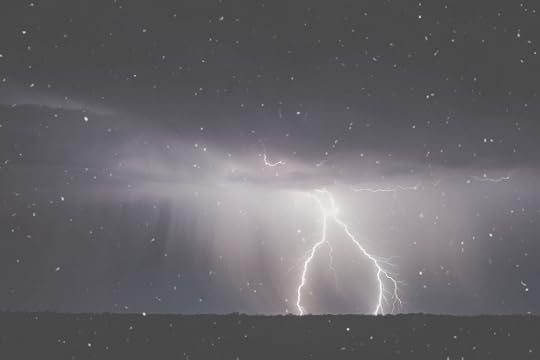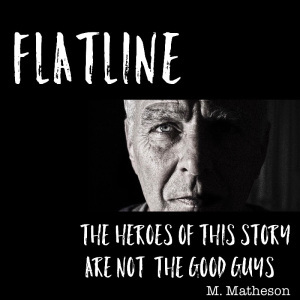M. Matheson's Blog, page 46
August 28, 2016
How To: Switch from a PC to a MAC
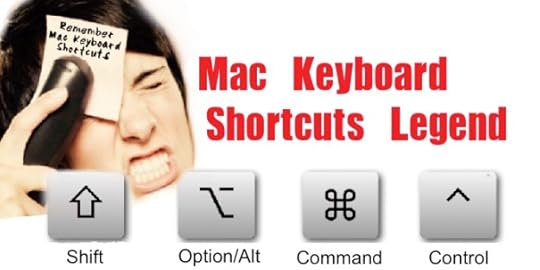
Switching from PC to Mac. This legend is nearly all you need.
Early in the late 90’s when personal computers first took hold of America and the world, I spent a thousand dollars for a Desktop PC that had only a smidgen of the computing power the iPhone in my pocket has now (and that came free—sort of—with my account).
Last year one day, I stacked up of all my used PC towers and laptops. I deceived myself into thinking I might be able to sell them on Craigslist. I wiped the data; I knew enough to know you don’t sell or donate a computer with your data still on it. How to securely wipe a hard drive.
I put up the ad; no takers. Then I tried to give them away, again, No Takers. It seems that wiping all the data includes nuking the Operating System which makes them worthless. The year before, I had purchased a MacBook Pro and soon after realized that compared to that Mac, those PCs were trash even with all my valuable data and an operating system. Their only value was as gadgets designed to suck hours from my day, fill my head with frustration, and siphon dollars from my wallet to pay to fix problems that randomly appeared from this air.
PCs, I found, are like teenagers. Constant attention is required to keep it from hurting itself. I am afraid to think about the thousands of dollars spent on Antivirus software and subscriptions to updates.
Why the hell didn’t I buy a Mac earlier?

The day I purchased my Mac, the quality of my life dramatically improved.
No longer did I have to stay up late guarding the gate or ferreting out unwanted malicious malware.

I shudder to think how many hours I had spent simply staring at the screen waiting for something to load or an image to appear?
The Mac works tirelessly. Gone are the freeze outs and Blue Screen of Death after the PC feels overworked and goes on strike.
Apple Computers, in my book, are nearly flawless. I can work with two browsers open, six tabs on each, an image editing program, a Word document, and an Excel spreadsheet all open on my desktop, and when I need to leave for awhile, I close the lid.
No special shutdown sequence, magic dance, or praying, it will work when I’m ready. Hours later, I can open the lid to find my work area just as I left it and ready to perform. My Mac has only frozen twice in two years. Rebooting took under five minutes. Not a bad trade considering the number of cumulative days spent on the same task with a PC over the years.
The only tight spot, a speed bump really, was the learning curve. I’m a big user of keyboard shortcuts, and Apple speaks another dialect. If you haven’t learned to use shortcuts while working on a computer, you are wasting precious seconds of your life and productivity. Why pull down a menu and search for the item when you can place two or three fingers simultaneously on the correct keys and get the same result? Mac Shortcuts
 The steepest part of the learning/unlearning curve were these hieroglyphic symbols for keys labeled with something different.
The steepest part of the learning/unlearning curve were these hieroglyphic symbols for keys labeled with something different.
What the hell are those? The Command key symbol is obvious enough, but those others are not exactly intuitive.
AND…
Backspace vs. Delete: On Macs, the Backspace key as PC users know it is named Delete. And the Delete key deletes from right to left, just like the Backspace key.
If you want to delete text from left to right (à la the Windows Delete key), you have to press Function-Delete (particularly if you’re on a laptop).
It only took me a few weeks to get that pattern hardwired into my frontal cortex.
The intrigue supplied by Apple with their hieroglyphic style keys was amusing and mildly frustrating but nothing that would send me crawling back to the Windows World. 
Still, every other day or so, after I pull a new menu down from the top bar on my computer, I have to get out a handy-dandy cheat sheet to decipher these symbols.
I need to staple these to my forehead.
 The Apple Command Key is Union Station on your Mac. Contrary to the Windows key function, the Command key works much like the Control key does on a Windows PC. Don’t go pressing the Apple key and expect a system menu to pop out of nowhere. Instead, use this key for your most common keyboard shortcuts.
The Apple Command Key is Union Station on your Mac. Contrary to the Windows key function, the Command key works much like the Control key does on a Windows PC. Don’t go pressing the Apple key and expect a system menu to pop out of nowhere. Instead, use this key for your most common keyboard shortcuts.
 The Control Key on the Mac isn’t used in the same way as the Control key on a Windows PC. I use it most often when I’m “right-clicking” on my Mac – often referred to as Ctrl-Click.
The Control Key on the Mac isn’t used in the same way as the Control key on a Windows PC. I use it most often when I’m “right-clicking” on my Mac – often referred to as Ctrl-Click.
 The Alt/Option Key is used to skip through words in a document (and highlight words when used in conjunction with the Shift key) – much like the Ctrl-Arrow functions work on a PC.
The Alt/Option Key is used to skip through words in a document (and highlight words when used in conjunction with the Shift key) – much like the Ctrl-Arrow functions work on a PC.
 The Shift-Arrow Symbol is straightforward enough and functions the same as Windows shift or a typewriter.
The Shift-Arrow Symbol is straightforward enough and functions the same as Windows shift or a typewriter.
 The whacked out ESC key symbol. But, as I meditate on it, it makes perfect sense.
The whacked out ESC key symbol. But, as I meditate on it, it makes perfect sense.
Check out this handy reference table, for a more comprehensive list of the Mac keyboard symbols.
A final word on Keyboard shortcuts (I promise)
Fortunately, when it comes to keyboard shortcuts, many on your Mac are the same as on your Windows PC. Ffor many of the usual shortcuts, you can simply swap out Command for Control. The Ctrl-C/X/V to Copy/Cut/Paste become Cmd-C/X/V.
Simplicity is the reason Apple Products are so popular. That and the COOL FACTOR.

If you found this useful please, LIKE, COMMENT, or SUBSCRIBE.


August 27, 2016
Criticism
From a favorite Blogger SHREYAKHETAN a brilliant acrostic poem for CRITICISM
Cuddling me when I don’t want to ,”go away ” I shouted but the voices wouldn’t listen.
Source: Criticism


August 25, 2016
The Myth of Ordinary
 or·di·nar·yˈôrdnˌerē/ turns out to not be so ordinary after all.
or·di·nar·yˈôrdnˌerē/ turns out to not be so ordinary after all.
Since there is only one of you and one of me, how can there be any ordinary people? Even the simplest of human beings can parse the correct answer.
Perhaps in its usage, such as, ordinary looks or he was quite ordinary we are being quite prejudiced and simply trying to place whom we feel is less desirable somewhere under us in the prehistoric pecking order.
Maybe Ordinary People should rise up in armed revolt and demand equal time, pay and attention to their ordinariness. Of course, at that point, they would stop being ordinary and the rest of us extraordinary persons would embrace them into the fold of special people.
Taking my tongue out of my cheek and choking down my self-entertaining humor for a minute, let’s get serious: each one of us is extraordinary. The creator’s mold was broken when you broke the womb on the day of your birth; or depending on your belief system, the mud puddle dried up after you crawled out of it.
How much better would our world be if we saw no one as typica l and there was no such thing as normal? If you pictured the person on the train next to you as extraordinary, your fear and bigotry would melt into nothing.
l and there was no such thing as normal? If you pictured the person on the train next to you as extraordinary, your fear and bigotry would melt into nothing.
Leaving that dead horse to die on its own, consider today. Today is no ORDINARY DAY. This day, August 25, 2016, will not come again. When the clock tolls MIDNIGHT, it is all in the can. Those things you put off until tomorrow—which is finally here—didn’t get done. You are late or even later depending on how many times you pushed that chore into the future.
If you intended—yesterday—to tell your kids, spouse or parents how much you love them, you missed the boat. I am normally a fiction writer, but as my own press says, I am also a curator of truth.
As you read this, I can see you visibly bobbing your head in agreement. 
Today is extraordinary since it has never been before and never will be again. There are monumental news items that will happen today and never again. Some good. Some bad.
People will come into the world and some will leave, and none of them will be ordinary.

Speaking of death, let today be the death of ordinary in your life, and the birth of extraordinary. Today you can do things that can’t be done tomorrow, and if you do push them off the cliff into the next day, they just might lose their impact.
The death of ordinary is the death of boredom.
In this amazing world of ours, it never fails to amaze me at how often I hear people tell me how bored they are.
Books still exist, at least in America, READ ONE before they’re not. Book lovers are on the decline, though. Movies, some of them good, are churned out at a phenomenal rate, and there is always Netflix and Amazon Prime if you happen to have watched the 300-600 new movies made every year.
I personally think there is no good excuse to be bored, but for a differing POV (point of view) and a great article click here.
I am on a vendetta; wreaking my own form of vigilante justice against the tyranny of the ordinary.
Have an extraordinary day, you are a phenomenal person; you deserve it.
Peace,
M. Matheson



August 22, 2016
Nightmares
I Love this dark poem, and I learned a new word.
pet·ri·chor
ˈpeˌtrīkôr/
noun
a pleasant smell that frequently accompanies the first rain after a long period of warm, dry weather.
“other than the petrichor emanating from the rapidly drying grass, there was not a trace of evidence that it had rained at all”
Let the sound of the trembling thunder scare away the nightmares, let the flashes of lightning burn these horrid images from my eyes, and let the rain wash away all my troubles until there’s nothing left but your storm and the lingering, peaceful scent of petrichor you leave behind.
© Sarah Doughty
For the ‘Support Insta Writers’ August Prompts
(based on books written by authors in the IG community)
hosted by Tracy and Journee.
This Beautiful Curse by @kris_johnston_author


August 15, 2016
True Heroes
This is a piece I wrote two years ago as I reflected on the ongoing effects of my birth father who died nearly fifty years ago. And, the manically dysfunctional life I lived ‘spun out’ for too many years. I was fortunate that my life was bookended by a second father who also passed on, but after many sacrificial years of demonstrating what true heroes are and how they never die.
To my birth father Elmore ‘Matt’ Matheson and my second father Howard ‘Hank’ Smoyer, this piece is dedicated.
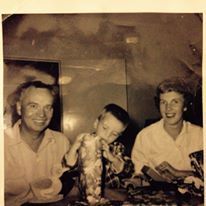
Christmas 1959 Mom Dad n Me
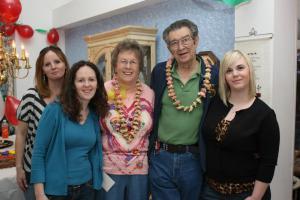
Dad Smoyer, Three of my Girls, and Mom
~~~True Heroes Never Really Die~~~~
Like a rain-soaked cloud on a stormy day, his death blanketed my mind infusing every pore. My breath felt strangled, and every hope abandoned leaving only sadness in its sloshing wake. My young soul simmered to bursting without any relief in sight.
My dad was gone. Goddamnit!
Ten-year-old boys are not equipped to suffer such a wrenching loss as death which seemed to me to be the main attraction that day. The closing act designed to erase my father’s life from this earth.
Center stage stood the shiny casket amidst garish sprays of flowers you only ever see at horse races—and funerals. I sat neatly filed away between Mom and Grandma, and from there I could see the waxen features of Dad’s strong face protruding from the polished box. Archaic piped-in hymns kept the mood in the room at full-tilt grim, and Death’s boots stomped their indelible print into my miserably shattered soul.
We family members had been segregated well away from the larger gallery of—mere spectators—whose obligation was to be witnesses of our collective grief. A week later they would adjust their lives to do without Ellmore ‘Matt’ Matheson. Five decades (and counting) later he continues to occupy a front row seat in my day-to-day life.
Despite the drowning sadness of that day, my faith was at its peak; I clung desperately to a vain hope that Dad would shake himself awake and climb from that wretched box. Then we could go back home to the wonderful humdrum of our lives.
The crowd queued up to file passed the open casket.
Not me. No, sir. No way.
I WOULD NOT be part of that ghastly parade.
More than one well-meaning relative stopped. With a gentle pat on my hand and a few seemingly kind words, they attempted to coax me into coming along for a look at his corpse as if it was as easy as a trip to the zoo.
What could they have been thinking?
Was tradition so indispensable they found it necessary to heap even more torment onto such a young boy?
A horde of silent whispers grew in my head as I felt every spectator struggling not to look in my direction. Why couldn’t they see that I had the most skin in this game? And a game it seemed to me at the time.
Even though my family and friends were all around me, I felt utterly abandoned. The only person with enough care or courage to sit with me lay stretched out in a casket.
He would have done so whether I was his son or not.
I was an only child, but now had less than nothing.
Why had I been singled out to be cheated of my father?
Where was God while my dad lay dying? (In a hospital room I was deemed too young to visit)
What, besides pure evil (perhaps ignorance) could let a child bounce down such wicked tangents like the jagged rocks of death?
An unfamiliar rage crept like a wolf on the prowl and circled through the dark forest that I was not mature enough to see closing in on me. Life was no longer innocent.
Hunched around its dying fire for warmth, my innocence, and ambient peace was stolen away in such small bites that I wouldn’t recognize what had happened till years later after anger bloomed with a life all its own.
It wouldn’t be until twenty-five years following that the fiery bitterness would finally begin to cool. The treasure Dad had stealthily hidden away would finally get to see daylight.
Since that ugly day so long ago, I’ve amassed a growing corps of personal heroes, yet, compared to a father, they play only minor supporting roles in the story of my life. I look to them to spur my skill, talent, and gifting; to inspire me to strive in character and craft. But, the Drum Major stands his post ahead of them all, and Barely a day goes by without his lessons and examples working their way to the surface of my decisions, actions, and exploits. It’s incredible how much soul Dad was able to pack into the short ten years he guided my growing little life, almost as if he knew his time would be short.
If I die knowing my life had even half as profound an effect on my children and grandchildren as Dad had on mine, my life will have been well lived.
My earliest memory of Dad was when I was three or four years old. Somewhere in Europe, I was hanging from the doorway of a car and peeing into a malevolent rainstorm. He drew enough bravery from me that night to voluntarily dangle from an open door and do my business.
As years went on, he taught me the much more noble art of growing things. I sold produce to our neighbors, grown in my vegetable plot. Still, clear in my mind is Dad helping me discover the mystery of black spots that showed up on the leaves of my plants: Charcoal in the soil. Today no one could accuse me of being a good gardener, but how many lessons in commerce, responsibility, and hard work grew in that little garden? Over time, those experiences would grow into factory management and eventual business ownership.
Dad was able to correct my pigeon-toed feet single-handedly by using simple, kind and consistent reminders not to walk like that.
When I show my five-year-old son how to throw a ball, or I must admonish his behavior, Dad still whispers in my ear the right words to say.
On one of many spontaneous early A.M. fishing trips, I remember catching a crab, monstrous-looking by seven or eight-year-old standards. Its fearsome claws awed me, but Dad saw an opportunity for a lesson in courage.
“It’s not as scary as it looks,” he said.
“Put your finger in the pincers and see.”
I drew back and shrieked, “No!” but Dad exerted the mild pressure it took to get me to do anything he asked, and I put my finger in the claw. Of course, he was right. Just a little pinch. Today I know that most things are fiercer in appearance than in reality.
Anything Dad asked me to do, I would do. And defiance, so commonplace in young people today, was nearly inconceivable for me. His ‘suggestions’ had the power to pull daring, hard work and sacrifice from a timid little boy who would rather not be those things.
Running home one day, from the threats of a bully (older and taller than I) Dad turned me around and marched me back to face Dale Rudd. Up until the very moment that Dad said, “Fight him,” I fully expected he would take care of the menace for me. That battle looked more like a dance than a fight (I’m sure Dad knew it would). Lesson learned—Never back down from a threat, and the slightest temptation to do so sets me to thinking of Dad standing next to me.
He and I built a slot car track out in the garage. It was on a large board with pulleys that could be pulled up to the rafters and out of the way. How many simple things such as the use of tools and more complicated things like patience and persistence do you suppose that project taught me?
My fondest recollections include going to work with Dad during my summer vacations. He had retired after twenty-seven years in the Army and now worked for the Santa Ana Parks Department. Eating lunch with him and his coworkers made me feel much older than my seven years. I spent the day catching frogs while he worked. One day, we took the frogs home in Chinese food containers, and on the ride home in our cavernous four-door blue and white ‘55 Chevy they all disappeared. Those frogs were small but not minute. We never did find them. I imagine him telling that story in heaven and getting laughs all around.
Above all, I think Dad taught me to be kind. It was his standout trait and showed in everything he did. He never explained, it was just part of who he was. You could be sure not to mistake his kindness for timidity or weakness, though. He was never afraid to stand up for himself or an innocent victim of someone else’s abuse. He had some strong views on world affairs that wouldn’t be very user-friendly today.
In those days, a family outing could simply be to drive around the city or countryside. One of my greatest memories occurred during one of those. Dad accidentally hit and killed a small dog. I remember sitting in the car with Mom as he picked up that dead Wiener Dog and carried it through the neighborhood looking for its owners so he could tell them he was sorry. No further words should be needed here as a testament to his caring, kindness, and strength of heart.
If in the end, I turn out half as kind, compassionate, and brave as Ellmore H. Matheson, I’m good.
The bitter memory of not being allowed to visit my dad in the hospital where he died sits aching in my head like an abscessed tooth. I was too young they said. I’m glad it’s not that way today. In that at least, our society has grown more compassionate.
Paramedics’ vain attempts to force my dad to ride the gurney downstairs after a cardiac episode was the last time I physically saw him alive. His repeated remonstrances still ring in my head. Every day that he was in the hospital, I looked forward to talking to him on the phone. I don’t recall what we talked about, but I know both of us fully expected him to come home; until the day, I returned home to a gray room and a tearful mom.
“Sit here Mikey,” she said patting the cushion next to her.
The day of his funeral is still clear as yesterday. I was 10-1/2 years old. No young son should have to bury his father. Unfortunately, for us in this violent, disease prone world, it happens much too often.
My unwillingness to view his body did not come from fear. I just refused to see my hero like that. He was Superman strong, and I knew without a doubt that he loved me. He had the answer to every question.
It has taken many years of life in the raw to learn that a hero like him could never actually die but lives on in every breath, decision and deed of my life.
Today he is just as strong if not stronger, and now forty-nine years down the road many of the seeds he planted in the first decade of my life are just now bearing their fruit. That’s a real hero and one that can never truly die.
Epilogue
Many years later, I was an adult stuck in a tailspin; my mom married another great man. It took me several years to recognize and reconcile him as a father to me. But I am glad that I did.
In discussing this thought with a good number of people, I found it hard to find more than a couple individuals (especially men) that had even one GOOD father in their life. I’ve had two and understand my tremendous great fortune.
While writing this piece my second father was battling cancer from which we all fully expected him to recover. He died just as I was finishing this piece.
Howard “Hank” Smoyer earned the right to be called my Dad. He was not an ‘also ran,’ but another real hero that will never die.
Dad had a love for history and Football. Football never rubbed off on me, but his love of history fueled mine. He shared his books with me most notably the Aubrey-Maturin series by Patrick O’Brian. Historical novels about the English Royal Navy set in the Napoleonic era. There was twenty-one in all; he would me mail me one and I would mail it back when I finished. The postage cost as much as the book, but we both enjoyed the system. He was Irish-Catholic to the core and loved Notre Dame.
The minister who spoke at his funeral did not know him. Hank Smoyer was not a churchgoer, but knew his Bible and had a love for God.
The minister interviewed the children of whom there are seven between my Mom’s and his own, and came away with this picture:
At the funeral, he said he’d gotten a clear vision of Hank Smoyer and used this text:
Philippians 2:3 Let nothing be done through selfish ambition or conceit, but in lowliness of mind let each esteem others better than himself.
There wasn’t a dry eye in the house because everyone knew the minister had nailed it. Dad was indeed selfless, sacrificial and concerned with others above himself. Even when people betrayed and stole from him, he never gave in to bitterness and never cut them off from his compassion.
Towards the end of his life, no one knew how truly sick he was because he continued to cook, shop and take care of the homestead and the people around him.
I am sure this is why he only lasted a couple of days at home on hospice care. He did not work well with being taken care of. He told me he had made his peace with God and to see first-hand his love for my Mom was inspiring. Theirs was a flaming hot romance to the end.
Mixed up in the midst of all my madness and trouble, God used two real men to sculpt my life, and they are carving away still.
True heroes can never really die.
Peace,
M



August 11, 2016
Goodreads | Leo Tolstoy Quotes
“We can know only that we know nothing. And that is the highest degree of human wisdom.” ― Leo Tolstoy, War and Peace
Source: Goodreads | Leo Tolstoy Quotes (Author of Anna Karenina)


Flatline—What people say…
From my editor Beth Hercules at BZ Hercules:
M. Matheson uses his wry humor and experience to portray the lighter side of life.
Even in the midst of a world bristling with murder and mayhem, his positive spirit shines through. Mike displays a confidence with the written word that is reminiscent of Hemingway at his peak!” -Beth Hercules (Editor)
Flatline is available for preorder now. Releasing 9-1-2016:
From M. Matheson,
Beth has edited both my books. She has been a pleasure to work with, is fast, and accurate.
She offers a variety of editing services and promotion packages at very reasonable prices.
Every bit of her work is first-rate. ⭐️⭐️⭐️⭐️⭐️
If you are a new author or well-seasoned, you cannot go wrong using any of BZ Hercules’ services.

MMatheson Updates


August 7, 2016
Here At Last
If you are reading this, you already know it’s true. M. Matheson has gone from the land of UNDEAD Blogger page (no offense, it served me mediocre-like for years). Thank you, Google, but WordPress is better. I feel like a real… something. Let me pause to celebrate.

WhooHoo!!
While you are here, pour a beverage of your choice, download a free story, read my last post, and Preorder Flatline. If you like anything you see send me a note. If something bugs you and sticks in your craw, do likewise.
WordPress made this chore a snap, my hat (if I wore one) is off in solemn salute.
Thank you, to all my loyal readers and fans. May your life be filled with peace and good things.
M. Matheson


July 27, 2016
Preorder Flatline Now
Flatline is a fantastic story full of guns, guts, and modern day outlaws in the ancient tradition of Robin Hood. Using their unique skill set of fearlessness and unwinking violence, these outlaws seek to right the scales of injustice, at least as they see it.
I hope you get to read this story. You will not be disappointed. If stories full of crime, violence, blood and a dash of splattered brains are your thing, this story will scratch your itch.
[image error] Troy Bittles is a retired second generation Enforcer for the world's largest motorcycle club. Caught in the angst of boredom after a life of action, power and violence, he amuses himself by writing books and helping his neighbors out of jams that fall beyond the scope of Law Enforcement. Using his unique skill set of fearsome and unflinching violence, he collects wayward children, spouses, and bail jumpers. Slumlords and bullies fear him. The only real family he has is a Mexican Cartel, Casa Rafael, who he serves as an on-call mercenary. Through a series of unpredictable events, Troy is thrust stumbling headlong, against his will, back into a violent world where he'd spent most of his life. Strong-armed into HITTING a family of accountants, he has the nerve and the tools for the job but is unwilling, no matter if it costs him his life, to kill their child. Troy creates an elaborate plan to save the boy which will certainly put a price on his head. Within the ugliness of the deed itself, he sees a possibility for redemption from a horrendous and haunting deed from his past. The story begins in Sacramento and runs through Arizona into the arms of a Mexican Cartel, Casa Rafael. In Nicaragua, he and Silas Parker, once his bitter rival, team up to rid a community of a bully who thinks himself the new and improved Fidel Castro. Their last stop is South America where Troy leads a team of killers against the murderers of innocent children.The ending was unpredictable and shocked me as I wrote it.Available for Preorder now for a September 1, 2016, release date.

July 1, 2016
Life is Like an RC Car
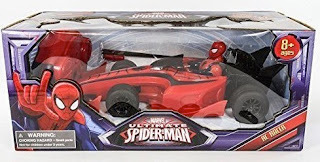
I thought he’d have a lot of fun with a real car as I coached from the sidelines and told him what and how to do it. As I watched, I realized one thing, I was missing a whole lot of fun.
 This first car is a 1/18th scale Monster Truck made by Dromida, a division of Revell. In no time at all, Tobias was very good at driving it.The title of this piece is, Life is Like an RC Car, which brings up my first point. You can sit on the sidelines and watch someone else live life a la TV or Cable News and Reality shows or perhaps even your more adventurous friends. Or, you can get out and live it. Join in the fun.
This first car is a 1/18th scale Monster Truck made by Dromida, a division of Revell. In no time at all, Tobias was very good at driving it.The title of this piece is, Life is Like an RC Car, which brings up my first point. You can sit on the sidelines and watch someone else live life a la TV or Cable News and Reality shows or perhaps even your more adventurous friends. Or, you can get out and live it. Join in the fun.
So, I decided that WE needed a second car. Bigger and better of course. The red one on the right is our second car A Redcat Volcano. The second point in Life is Like an RC Car:We live under the false impression that bigger, faster, and better—is—better.
 You do know the answer to this, don’t you?First day out, that new car dropped a steering hub with no parts locally available. Our new Golden Calf had let us down.Once it was back up and running (a week later), it proved itself to be a whole lot of fun, but again things started to break. I now know one of the main Axioms of RC cars: They break. Get used to it.So, anyway having one big car and one little car proved itself a mismatch and less fun than ideal… In comes the second small car. $100 Brand New at RC Country is Sacramento. The fun quotient ramped up once again.
You do know the answer to this, don’t you?First day out, that new car dropped a steering hub with no parts locally available. Our new Golden Calf had let us down.Once it was back up and running (a week later), it proved itself to be a whole lot of fun, but again things started to break. I now know one of the main Axioms of RC cars: They break. Get used to it.So, anyway having one big car and one little car proved itself a mismatch and less fun than ideal… In comes the second small car. $100 Brand New at RC Country is Sacramento. The fun quotient ramped up once again.

The third point in Life is Like an RC Car:
 One, two, or even three is never enough. Rockefeller (the original) was once asked, “How much money is enough?” The world’s richest man at the time replied, “Just a little more than I have.” Same holds true for RC Cars and all the friends I have made in this hobby/sport, all agree.
One, two, or even three is never enough. Rockefeller (the original) was once asked, “How much money is enough?” The world’s richest man at the time replied, “Just a little more than I have.” Same holds true for RC Cars and all the friends I have made in this hobby/sport, all agree.
 'Most' of our stableNow we have two big ones and two smaller ones and we use them often. Now that we’ve found some cool racetracks, especially Rescue Raceway in Rescue, CA , we want them to run more often which means upgrades. And, did I say faster too?This brings up the last point I’ll make in my RC Cars as a metaphor of life.Once you get it working, you want it to work better and faster.And once it goes faster, the weaker systems start to break. You beef up that weaker system and now the next weakest fails. Same too in life.Just when you think you have it all together, the next weakest link will fail. Which will cost you money, sweat, time, and frustration, but it’s worth it.
'Most' of our stableNow we have two big ones and two smaller ones and we use them often. Now that we’ve found some cool racetracks, especially Rescue Raceway in Rescue, CA , we want them to run more often which means upgrades. And, did I say faster too?This brings up the last point I’ll make in my RC Cars as a metaphor of life.Once you get it working, you want it to work better and faster.And once it goes faster, the weaker systems start to break. You beef up that weaker system and now the next weakest fails. Same too in life.Just when you think you have it all together, the next weakest link will fail. Which will cost you money, sweat, time, and frustration, but it’s worth it. Or, you could just sit by never change and watch others have all the fun.


